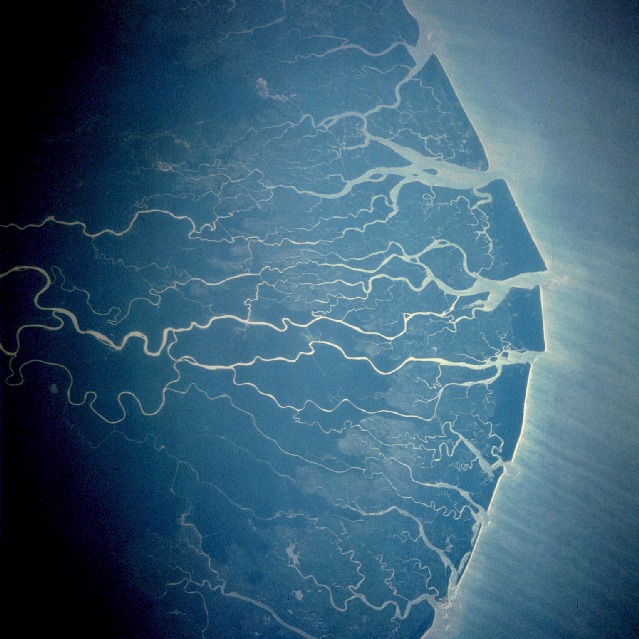 |
| Image from Wikipedia |
Over the last three decades, both
communities and policymakers have become increasingly concerned over the
negative consequences of oil exploration and related human activities
in the Niger Delta. This has led to the search for solutions to minimise
the negative impact of oil exploration, restore the environment and
accelerate development. At the regional level, we have had the 1.5
percent Oil Producing Areas Development Fund; 3 percent Oil Producing
Areas Development Fund; Oil Mineral Areas Producing Development
Commission; and Niger Delta Development Commission (NDDC).
The states are not left out. Rivers
State government set up the Rivers State Sustainable Development Agency
to address the issue of sustainable development. Delta State’s version
is Delta State Integrated Development Programme and Delta State Oil
Producing Areas Development Commission (DESOPADEC). Other Niger Delta
states have different sustainable development vehicles that go by
different nomenclatures. The oil companies that are at the centre of the
environmental degradation have also set up platforms to address
sustainable development. SPDC has its Global Memorandum of Understanding
(GMOU). Mobil, Eni and Chevron have similar programmes too.
All these initiatives are commendable,
but the communities or the local people are not on the driving seat. The
initiatives have, however, brought to the fore the practice of
sustainable community development in trying to address the challenge of
development in the Niger Delta. The United Nations Commission on the
environment and development defines sustainable community development as
growth that meets the needs of the present without compromising the
ability of future generations to meet their own needs. It presupposes
environmentally sound, economically productive and socially just
communities which, without doubt, are not the case in the Niger Delta.
One undeniable implication of the above
scenario is the urgent need to change our current development strategy.
New community development challenges call for adoption of new
strategies. As people of the Niger Delta, therefore, we must do things
differently from how we had approached it in the past. One trend that
can be inferred from all the community development vehicles or platforms
mentioned earlier is that they are not driven by the community people
themselves. We face our challenges at the community level; thus, it is
also at this level that we can search for solutions to our problems.
This is the basis for Andoni-Opobo-Nkoro Economic Zone Development
Summit. It is basically a platform that brings professionals and
stakeholders from the communities to plan for themselves and seek
solution to common challenges. Unlike all the other development
initiatives, this is conceptualised and driven by the people themselves.
There is no external propelling force.
Andoni/Opobo/Nkoro people are found in
two LGAs of Rivers State. On the face value, they are one of the most
disadvantaged people in Rivers State. The two LGAs are not accessible by
road. The state government, led by Chibuike Rotimi Amaechi, is building
a 41km unity road with 10 bridges to connect almost all the communities
of the two LGAs to the rest of Rivers State. Aside from the challenge
of road infrastructure, the people are not connected to the national
grid and do not have good source of potable water, despite being located
on islands. Rivers State government is building several brand new
primary schools and two other 1,000-capacity students’ residential
secondary school in the area. The environment is undoubtedly harsh. It
is in this development context that they have chosen to do things
differently to achieve sustainable community development through the
vehicle of a summit. This, for me, is very commendable.
The Andoni-Opobo-Nkoro development
summit has four components. The first is to showcase the latent
opportunities that abound in the area and invite potential investors to
take advantage and invest. The second component is to present to
development partners, government and stakeholders a forward-looking
master plan that captures the aspirations of the people. The third is to
build capacity of the people and communities to prepare them for
opportunities; and finally, to raise awareness on sustainability in
community development.
Fundamentally, there are numerous
differences between the Andoni-Opobo-Nkoro concept of development and
others, but five are worth highlighting. Ecological protection is
mainstreamed in development by community people themselves. Economic
self-sufficiency is emphasised. Livable community marked by
opportunities for sociability, diversity, personal development and
community participation is prioritised in development planning; access
to qualitative and affordable education and healthcare is given
precedence; social justice that guarantees peace, law and order is
pursued holistically. Most important of all these is that the process is
envisioned and driven by communities themselves.
At the forthcoming summit, United
Nations Under Secretary-General and Executive Secretary of Economic
Commission for Africa will lead high level thought-provoking sessions. A
former chairman of Federal Inland Revenue Service will train budding
women entrepreneurs. There will also be a session for youths on
leveraging local content law, amongst other breakout sessions. One of
the highlights of the summit is the presentation of Andoni-Opobo-Nkoro
draft master plan. All stakeholders in the area are deeply involved in
the process. There is a fervent belief that when the issue of
sustainability is tied to the community’s vision, it has capacity to
successfully resolve many key development challenges faced by the area.source: businessdayonline.com









